Module 7 A famous story Unit 3 Language in use习题课件(共26张PPT)
文档属性
| 名称 | Module 7 A famous story Unit 3 Language in use习题课件(共26张PPT) | 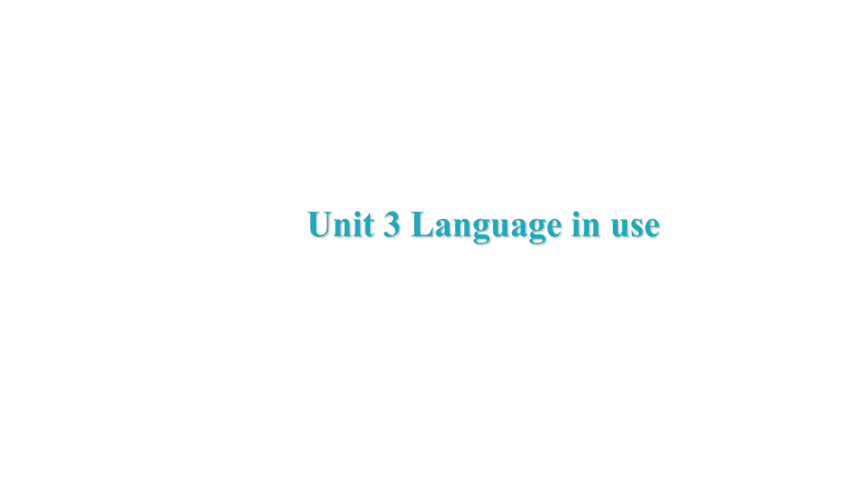 | |
| 格式 | ppt | ||
| 文件大小 | 296.0KB | ||
| 资源类型 | 教案 | ||
| 版本资源 | 外研版 | ||
| 科目 | 英语 | ||
| 更新时间 | 2022-08-18 13:54:09 | ||
图片预览

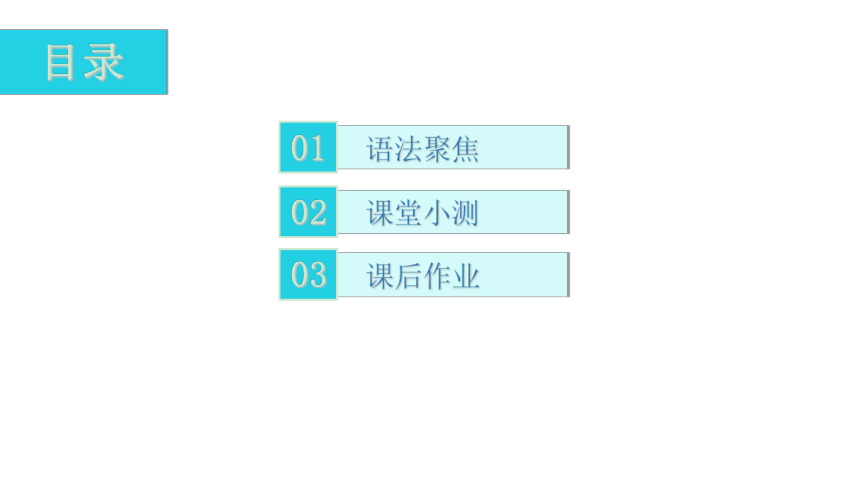
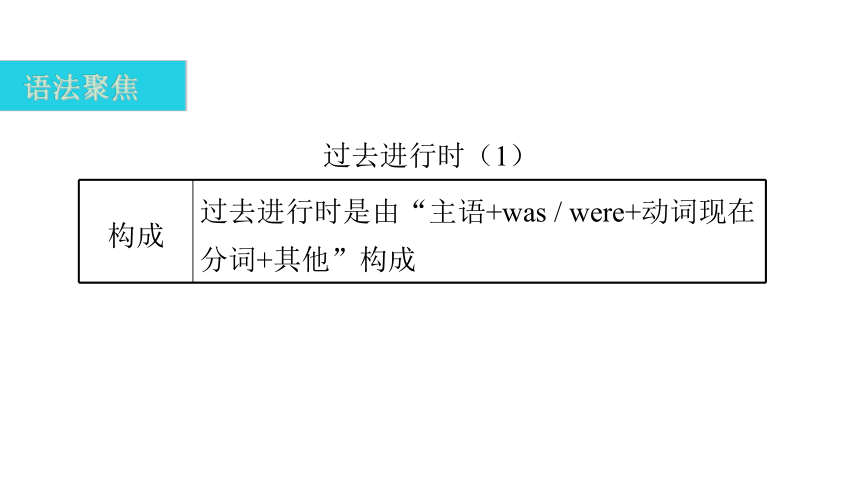
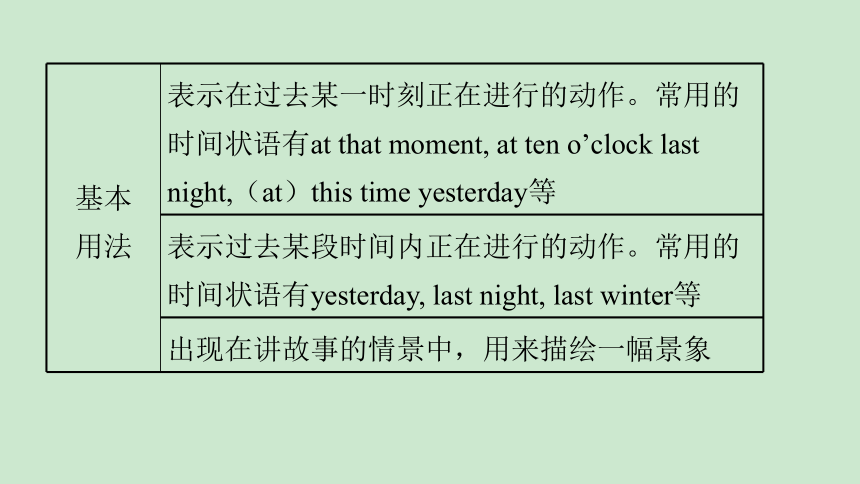
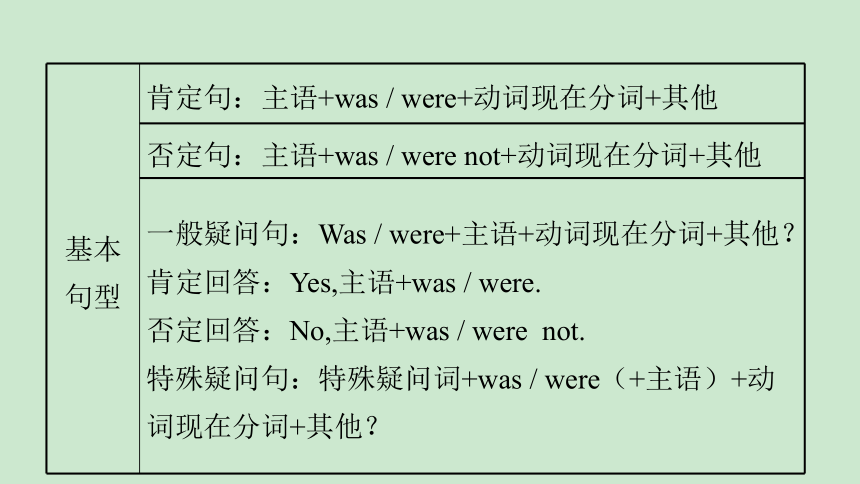
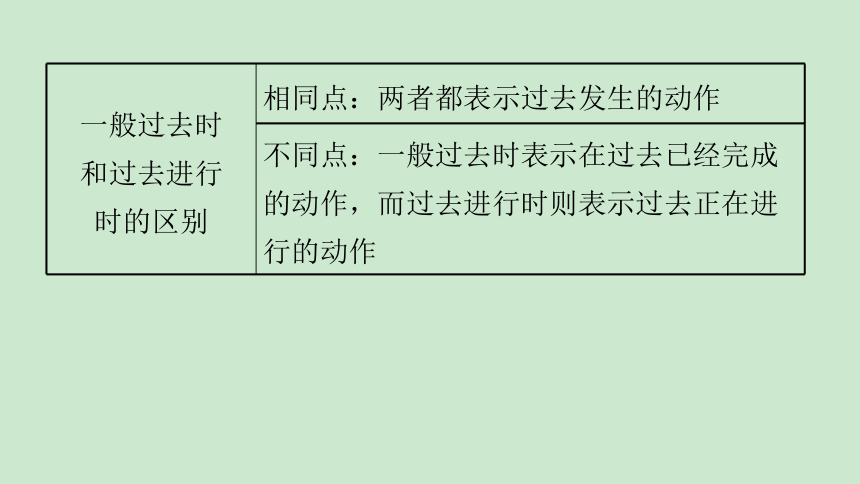
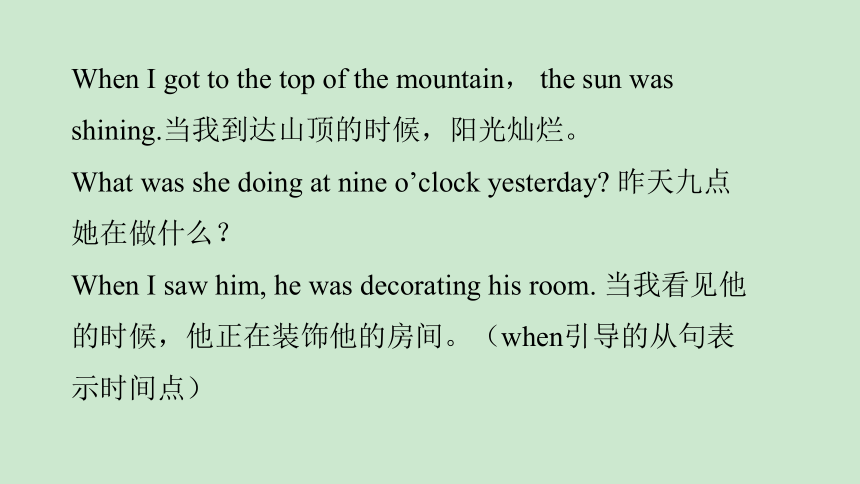
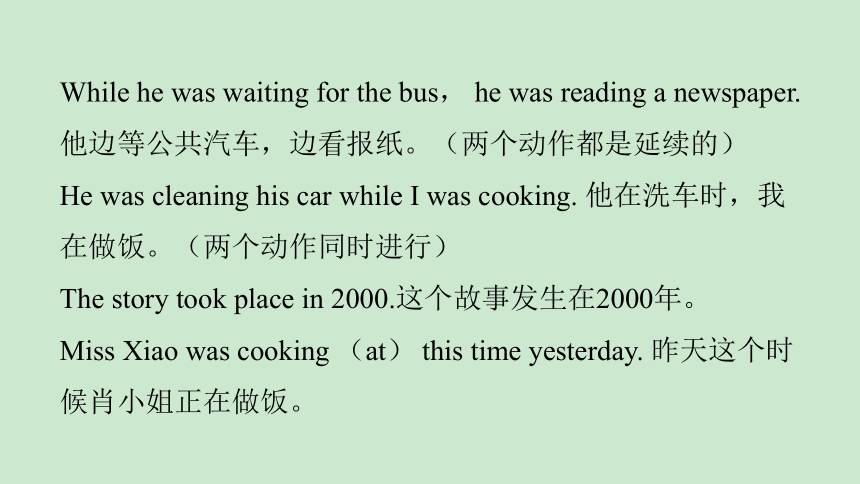
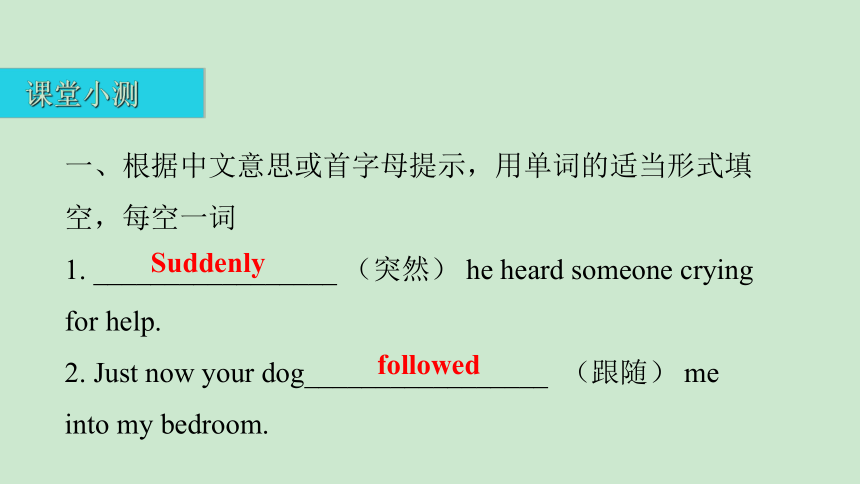
文档简介
(共26张PPT)
Unit 3 Language in use
目录
语法聚焦
01
课堂小测
02
课后作业
03
语法聚焦
过去进行时(1)
构成 过去进行时是由“主语+was / were+动词现在分词+其他”构成
基本
用法 表示在过去某一时刻正在进行的动作。常用的时间状语有at that moment, at ten o’clock last night,(at)this time yesterday等
表示过去某段时间内正在进行的动作。常用的时间状语有yesterday, last night, last winter等
出现在讲故事的情景中,用来描绘一幅景象
基本
句型 肯定句:主语+was / were+动词现在分词+其他
否定句:主语+was / were not+动词现在分词+其他
一般疑问句:Was / were+主语+动词现在分词+其他?
肯定回答:Yes,主语+was / were.
否定回答:No,主语+was / were not.
特殊疑问句:特殊疑问词+was / were(+主语)+动词现在分词+其他?
一般过去时
和过去进行
时的区别 相同点:两者都表示过去发生的动作
不同点:一般过去时表示在过去已经完成的动作,而过去进行时则表示过去正在进行的动作
When I got to the top of the mountain, the sun was shining.当我到达山顶的时候,阳光灿烂。
What was she doing at nine o’clock yesterday 昨天九点她在做什么?
When I saw him, he was decorating his room. 当我看见他的时候,他正在装饰他的房间。(when引导的从句表示时间点)
While he was waiting for the bus, he was reading a newspaper. 他边等公共汽车,边看报纸。(两个动作都是延续的)
He was cleaning his car while I was cooking. 他在洗车时,我在做饭。(两个动作同时进行)
The story took place in 2000.这个故事发生在2000年。
Miss Xiao was cooking (at) this time yesterday. 昨天这个时候肖小姐正在做饭。
课堂小测
followed
Suddenly
一、根据中文意思或首字母提示,用单词的适当形式填空,每空一词
1. _________________ (突然) he heard someone crying for help.
2. Just now your dog_________________ (跟随) me into my bedroom.
ockets
hile
trange
3.At last I found my keys in one of the p________ of my coat.
4. My father was reading a newspaper w________ my mother was cooking.
5. Don’t wear s________ clothes.You should behave like a student.
Was
playing
二、句型转换
6. Did he play computer games last night (用at this time last night改写句子)
_________________ he _________________ computer games at this time last night
was
playing
when
7. Tim is playing computer games. His mother returned. (用when合并为一句)
Tim _________________ _________________ computer games _________________ his mother _________________.
returned
What
8. We were playing football when it started to rain. (对画线部分提问)
_________________ _________________ you _________________ when it started to rain
were
doing
Were
9.I was writing a letter at 10 o’clock yesterday.(改为一般疑问句)
_________________ you _________________ a letter at 10 o’clock yesterday
writing
Why
10.The rabbit was running because it was late. (对画线部分提问)
_________________ _________________ the rabbit running
was
C
三、单项填空
( )11. Amon ______ his ship in a big storm when a giant fish came out of the sea.
A. will sail B. is sailing
C. was sailing D. has sailed
B
( )12. —I called you last night, but nobody answered. Where were you then
—Oh, I ______ my pet dog in my yard.
A. walked B. was walking
C. am walking D. will walk
C
( )13. I ______ an interesting book at 9:00 yesterday evening.
A. read B. am reading
C. was reading D. were reading
C
( )14. Sorry I’m late. I ______ with a friend and I completely forgot the time.
A.talk B.am talking
C.was talking D.will talk
C
( )15. Some exchange students ______ with their host families this time yesterday.
A.are chatting B.will chat
C.were chatting D.chatted
四、语法选择(核心素养:文化意识)
Hans Christian Andersen, a great Danish (丹麦的) writer, is very famous for his fairy tales (童话). He 16 a lot of best-known stories such as The Emperor’s New Clothes and The Ugly Duckling. His fairy tales have brought 17 to children across the world. The tales have versions (版本) of over 18 languages.
Andersen was born in Denmark in 1805. When he was still a young boy, he was already very clever and imaginative (富于想象力的). He created a small toy theatre and made clothes for 19 puppets (木偶). He also loved 20 .
In 1816, his father died and he learnt to be a tailor (裁缝). 21 ,he worked in a factory. 22 the age of fourteen, Andersen moved to the capital of Denmark to become 23 actor and gave performances (演出) in the Royal Danish Theatre. 24 , his voice changed when he grew older, so the job had to stop. Then he began to write poems and fairy tales.
In the spring of 1872, Andersen fell out of bed and didn’t get 25 again. He lived until 1875 and died peacefully at the home of his close friends.
( )16. A. write B. writes C. wrote D. will write
( )17. A. happy B. happiness C. happily D. happier
( )18. A. hundred B. hundred of
C. hundreds of D. a hundred
( )19. A. he B. his C. him D. himself
( )20. A. read B. reads C. will read D. reading
C
B
D
B
D
( )21. A. Before B. When C. Later D. While
( )22. A. In B. On C. At D. For
( )23. A. an B. a C. / D. the
( )24. A. Otherwise B. Therefore
C. However D. Besides
( )25. A. good B. well C. better D. best
C
C
A
C
B
Unit 3 Language in use
目录
语法聚焦
01
课堂小测
02
课后作业
03
语法聚焦
过去进行时(1)
构成 过去进行时是由“主语+was / were+动词现在分词+其他”构成
基本
用法 表示在过去某一时刻正在进行的动作。常用的时间状语有at that moment, at ten o’clock last night,(at)this time yesterday等
表示过去某段时间内正在进行的动作。常用的时间状语有yesterday, last night, last winter等
出现在讲故事的情景中,用来描绘一幅景象
基本
句型 肯定句:主语+was / were+动词现在分词+其他
否定句:主语+was / were not+动词现在分词+其他
一般疑问句:Was / were+主语+动词现在分词+其他?
肯定回答:Yes,主语+was / were.
否定回答:No,主语+was / were not.
特殊疑问句:特殊疑问词+was / were(+主语)+动词现在分词+其他?
一般过去时
和过去进行
时的区别 相同点:两者都表示过去发生的动作
不同点:一般过去时表示在过去已经完成的动作,而过去进行时则表示过去正在进行的动作
When I got to the top of the mountain, the sun was shining.当我到达山顶的时候,阳光灿烂。
What was she doing at nine o’clock yesterday 昨天九点她在做什么?
When I saw him, he was decorating his room. 当我看见他的时候,他正在装饰他的房间。(when引导的从句表示时间点)
While he was waiting for the bus, he was reading a newspaper. 他边等公共汽车,边看报纸。(两个动作都是延续的)
He was cleaning his car while I was cooking. 他在洗车时,我在做饭。(两个动作同时进行)
The story took place in 2000.这个故事发生在2000年。
Miss Xiao was cooking (at) this time yesterday. 昨天这个时候肖小姐正在做饭。
课堂小测
followed
Suddenly
一、根据中文意思或首字母提示,用单词的适当形式填空,每空一词
1. _________________ (突然) he heard someone crying for help.
2. Just now your dog_________________ (跟随) me into my bedroom.
ockets
hile
trange
3.At last I found my keys in one of the p________ of my coat.
4. My father was reading a newspaper w________ my mother was cooking.
5. Don’t wear s________ clothes.You should behave like a student.
Was
playing
二、句型转换
6. Did he play computer games last night (用at this time last night改写句子)
_________________ he _________________ computer games at this time last night
was
playing
when
7. Tim is playing computer games. His mother returned. (用when合并为一句)
Tim _________________ _________________ computer games _________________ his mother _________________.
returned
What
8. We were playing football when it started to rain. (对画线部分提问)
_________________ _________________ you _________________ when it started to rain
were
doing
Were
9.I was writing a letter at 10 o’clock yesterday.(改为一般疑问句)
_________________ you _________________ a letter at 10 o’clock yesterday
writing
Why
10.The rabbit was running because it was late. (对画线部分提问)
_________________ _________________ the rabbit running
was
C
三、单项填空
( )11. Amon ______ his ship in a big storm when a giant fish came out of the sea.
A. will sail B. is sailing
C. was sailing D. has sailed
B
( )12. —I called you last night, but nobody answered. Where were you then
—Oh, I ______ my pet dog in my yard.
A. walked B. was walking
C. am walking D. will walk
C
( )13. I ______ an interesting book at 9:00 yesterday evening.
A. read B. am reading
C. was reading D. were reading
C
( )14. Sorry I’m late. I ______ with a friend and I completely forgot the time.
A.talk B.am talking
C.was talking D.will talk
C
( )15. Some exchange students ______ with their host families this time yesterday.
A.are chatting B.will chat
C.were chatting D.chatted
四、语法选择(核心素养:文化意识)
Hans Christian Andersen, a great Danish (丹麦的) writer, is very famous for his fairy tales (童话). He 16 a lot of best-known stories such as The Emperor’s New Clothes and The Ugly Duckling. His fairy tales have brought 17 to children across the world. The tales have versions (版本) of over 18 languages.
Andersen was born in Denmark in 1805. When he was still a young boy, he was already very clever and imaginative (富于想象力的). He created a small toy theatre and made clothes for 19 puppets (木偶). He also loved 20 .
In 1816, his father died and he learnt to be a tailor (裁缝). 21 ,he worked in a factory. 22 the age of fourteen, Andersen moved to the capital of Denmark to become 23 actor and gave performances (演出) in the Royal Danish Theatre. 24 , his voice changed when he grew older, so the job had to stop. Then he began to write poems and fairy tales.
In the spring of 1872, Andersen fell out of bed and didn’t get 25 again. He lived until 1875 and died peacefully at the home of his close friends.
( )16. A. write B. writes C. wrote D. will write
( )17. A. happy B. happiness C. happily D. happier
( )18. A. hundred B. hundred of
C. hundreds of D. a hundred
( )19. A. he B. his C. him D. himself
( )20. A. read B. reads C. will read D. reading
C
B
D
B
D
( )21. A. Before B. When C. Later D. While
( )22. A. In B. On C. At D. For
( )23. A. an B. a C. / D. the
( )24. A. Otherwise B. Therefore
C. However D. Besides
( )25. A. good B. well C. better D. best
C
C
A
C
B
同课章节目录
- Module 1 How to learn English
- Unit 1 Let's try to speak English as much as possi
- Unit 2 You should smile at her.
- Unit 3 Language in use .
- Module 2 My home town and my country
- Unit 1 It's taller than many other buildings.
- Unit 2 Cambridge is a beautiful city in the east o
- Unit 3 Language in use .
- Module 3 Sports.
- Unit 1 Nothing is more exciting than playing tenni
- Unit 2 This year we training more carefully.
- Unit 3 Language in use .
- Module 4 Planes, ships and trains .
- Unit 1 He lives the farthest from school.
- Unit 2 What is the best way to travel.
- Unit 3 Language in use .
- Module 5 Lao She Teahouse.
- Unit 1 I wanted to see the Beijing Opera.
- Unit 2 It descibes the changes in Chinese society.
- Unit 3 Language in use .
- Module 6 Animals in danger.
- Unit 1 It allows people to get closer to them .
- Unit 2 The WWF is working hard to save them all.
- Unit 3 Language in use .
- Revision module A
- Module 7 A famous story
- Unit 1 Alice was sitting with her sister by the ri
- Unit 2 She was thinking about her cat.
- Unit 3 Language in use .
- Module 8 Accidents
- Unit 1 While the car were changing to red, a car s
- Unit 2 I was trying to pick it up when it bite me
- Unit 3 Language in use .
- Module 9 Population
- Unit 1 The population of China is about 1.37 billi
- Unit 2 Arnwick was a city with 200,000 people.
- Unit 3 Language in use .
- Module 10 The weathe
- Unit 1 It might snow.
- Unit 2 The weather is fine all year round.
- Unit 3 Language in use .
- Module 11 Way of life
- Unit 1 In China ,we open a gift later.
- Unit 2 In England, you usually drink tea with milk
- Unit 3 Language in use .
- Module 12 Help
- Unit 1 What should we do before help arrives?
- Unit 2 Stay away from windows and heavy furniture.
- Unit 3 Language in use .
- Revision module B
